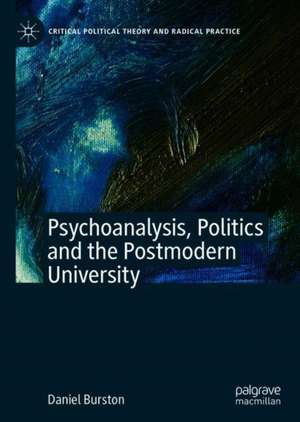Psychoanalysis, Politics and the Postmodern University: Critical Political Theory and Radical Practice
Autor Daniel Burstonen Limba Engleză Hardback – feb 2020
| Toate formatele și edițiile | Preț | Express |
|---|---|---|
| Paperback (1) | 568.14 lei 6-8 săpt. | |
| Springer International Publishing – feb 2021 | 568.14 lei 6-8 săpt. | |
| Hardback (1) | 573.46 lei 6-8 săpt. | |
| Springer International Publishing – feb 2020 | 573.46 lei 6-8 săpt. |
Din seria Critical Political Theory and Radical Practice
-
 Preț: 176.44 lei
Preț: 176.44 lei -
 Preț: 145.72 lei
Preț: 145.72 lei - 18%
 Preț: 712.59 lei
Preț: 712.59 lei -
 Preț: 371.08 lei
Preț: 371.08 lei - 15%
 Preț: 568.14 lei
Preț: 568.14 lei - 18%
 Preț: 765.64 lei
Preț: 765.64 lei - 18%
 Preț: 720.97 lei
Preț: 720.97 lei - 18%
 Preț: 776.52 lei
Preț: 776.52 lei - 18%
 Preț: 763.18 lei
Preț: 763.18 lei -
 Preț: 375.80 lei
Preț: 375.80 lei - 15%
 Preț: 518.93 lei
Preț: 518.93 lei - 15%
 Preț: 628.49 lei
Preț: 628.49 lei - 18%
 Preț: 769.06 lei
Preț: 769.06 lei -
 Preț: 194.83 lei
Preț: 194.83 lei - 18%
 Preț: 766.90 lei
Preț: 766.90 lei - 15%
 Preț: 572.65 lei
Preț: 572.65 lei -
 Preț: 375.05 lei
Preț: 375.05 lei - 15%
 Preț: 633.14 lei
Preț: 633.14 lei -
 Preț: 373.87 lei
Preț: 373.87 lei - 8%
 Preț: 495.96 lei
Preț: 495.96 lei - 18%
 Preț: 877.03 lei
Preț: 877.03 lei - 15%
 Preț: 625.41 lei
Preț: 625.41 lei - 15%
 Preț: 517.34 lei
Preț: 517.34 lei - 15%
 Preț: 492.82 lei
Preț: 492.82 lei -
 Preț: 379.01 lei
Preț: 379.01 lei - 18%
 Preț: 770.77 lei
Preț: 770.77 lei - 15%
 Preț: 633.14 lei
Preț: 633.14 lei - 15%
 Preț: 630.74 lei
Preț: 630.74 lei - 18%
 Preț: 929.19 lei
Preț: 929.19 lei
Preț: 573.46 lei
Preț vechi: 674.66 lei
-15% Nou
Puncte Express: 860
Preț estimativ în valută:
109.78€ • 112.90$ • 91.08£
109.78€ • 112.90$ • 91.08£
Carte tipărită la comandă
Livrare economică 15 februarie-01 martie
Preluare comenzi: 021 569.72.76
Specificații
ISBN-13: 9783030349202
ISBN-10: 3030349209
Pagini: 184
Ilustrații: XIX, 184 p.
Dimensiuni: 148 x 210 mm
Greutate: 0.4 kg
Ediția:1st ed. 2020
Editura: Springer International Publishing
Colecția Palgrave Macmillan
Seria Critical Political Theory and Radical Practice
Locul publicării:Cham, Switzerland
ISBN-10: 3030349209
Pagini: 184
Ilustrații: XIX, 184 p.
Dimensiuni: 148 x 210 mm
Greutate: 0.4 kg
Ediția:1st ed. 2020
Editura: Springer International Publishing
Colecția Palgrave Macmillan
Seria Critical Political Theory and Radical Practice
Locul publicării:Cham, Switzerland
Cuprins
1. Critical Theory and the Problem of Authority.- 2. Freud in America: The Golden Age, the Freud Wars, and Beyond.- 3. Jacques Lacan and Louis Althusser: Return to Freud?.- 4. Of Two Minds: Language and the Unconscious in Freud, Stern, and McGilchrist.- 5. Trump, Authoritarianism, and the End of American Democracy.- 6. Nietzsche, Postmodernism, and the Hermeneutics of Suspicion.- 7. Jordan Peterson and the Postmodern University.- 8. Anti-Psychiatry: The End of the Road?
Recenzii
“Burston’s book is an outstanding work of scholarship in which he favourably reviews Wilhelm Reich and Erich Fromm’s contention that ‘sadomasochism and authoritarianism are not confined to the extreme Right … . Burston endorses the mode of rational authority needed by democratic entities, which is the one that promotes competence and mutual respect.” (Ann Casement, Journal of Analytical Psychology, Vol. 66 (1), 2021)
Notă biografică
Daniel Burston is Associate Professor of Psychology at Duquesne University, USA, and the author of numerous books and papers on the history of psychology, psychiatry and psychoanalysis.
Textul de pe ultima copertă
Critical theory draws on Marxism, psychoanalysis, postmodern and poststructuralist theorists. Marxism and psychoanalysis are rooted in the Enlightenment project, while postmodernism and poststructuralism are more indebted to Nietzsche, whose philosophy is rooted in anti-Enlightenment ideas and ideals. Marxism and psychoanalysis contributed mightily to our understanding of fascism and authoritarianism, but were distorted and disfigured by authoritarian tendencies and practices in turn. This book, written for clinicians and social scientists, explores these overarching themes, focusing on the reception of Freud in America, the authoritarian personality and American politics, Lacan’s “return to Freud,” Jordan Peterson and the Crisis of the Liberal Arts, and the anti-psychiatry movement.
Caracteristici
Presents a fresh perspective on American psychoanalysis to inform critical theory and political practice Written to foster dialogue between clinicians and social scientists Offers a highly interdisciplinary approach, integrating concepts from philosophy, psychoanalysis, political theory, sociology and history
